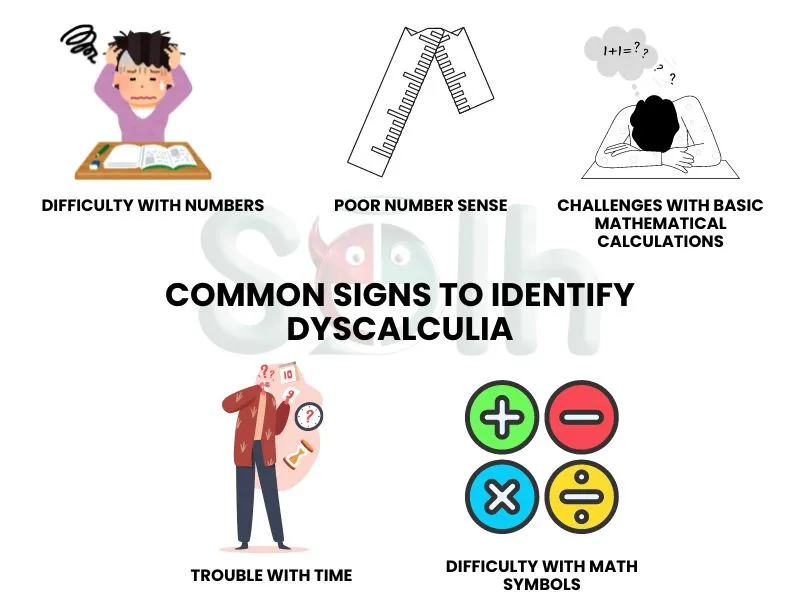Imagine sitting in a classroom where your teacher, with all her genuine efforts, is trying to teach you a new concept related to numbers. But for you, her voice fades into a distant hum as you are overcome by anxiety. The board filled with numbers and equations transforms into a battlefield where you find yourself devoid of the tools to deal with those monsters.
For many, this scene evokes the experience of math anxiety. However, for some people, this goes beyond simple discomfort; it is a battle with a learning disability called Dyscalculia.
Mathematics has always been considered a core academic subject for individuals to make sense of the world around them. From simple numerical operations to logical thinking, mathematics as a subject is seen as an important facet of learning. However, for some people, this may cause nervousness and the spur of fear. It is essential to know that this fear among people is more than merely a lack of interest in the subject. But it stems from the learning disability dyscalculia. The purpose of this blog is to raise awareness around this condition and to help all those individuals who are termed 'dumb' or 'stupid' because of their inability to excel in this subject academically.
Let's dive into the Dyscalculia guide:
What is Dyscalculia?
Dyscalculia is a specific difficulty that affects a person's ability to understand numbers, leading to a range of problems with mathematics. Famously termed the 'math monster,' Dyscalculia can occur among people of all ages. According to the National Institute of Health, 3-7% of all children, adolescents, and adults suffer from Dyscalculia. Unlike general math anxiety, Dyscalculia is a persistent difficulty that can impact everyday life.
Mathematical difficulties can best be understood as a continuum, not a distinct category. On this continuum of mathematical problems, Dyscalculia falls on one end and is distinguishable from other issues due to its severity of difficulty with number sense. Dyscalculia can occur singly, but often, it occurs with other learning difficulties.
What are the symptoms of Dyscalculia?
The diagnosis of Dyscalculia can be rather demanding as symptoms of this kind of disorder may vary significantly and can overlap with other learning disabilities. However, a few of the common signs that can help identify whether a person has this learning disability are:
Difficulty with Numbers: Individuals with Dyscalculia often struggle with basic number sense and facts. They may find it difficult to understand and remember basic number facts. Such individuals also find it hard to understand the relationship between numbers. For example, people with Dyscalculia may find it difficult to understand the association between a number and the quantity it represents.
Poor Number Sense: People with this learning disability have a weak sense of number magnitude. They find it difficult to estimate quantities. For instance, such individuals may struggle to determine whether one quantity is larger than another.
Challenges with basic mathematical calculations: People with these disabilities have difficulty performing basic mathematical calculations such as addition, subtraction, multiplication, and division. They also have difficulty remembering mathematical facts.
Trouble with Time: People with Dyscalculia have difficulty understanding the concept of time. This might include their inability to tell time on a clock, calculate change, or budget.
Difficulty with Math Symbols: A person with Dyscalculia can face problems comprehending and applying ordinary mathematical signs.
How Does Dyscalculia Affect an Individual?
The impact dyscalculia can have on individuals is profound. From their academic performance to everyday life, Dyscalculia can be daunting for people in many respects. Here is how it profoundly impacts an individual:
Impacting individuals academically
The impact of Dyscalculia is often evident in an individual's foundational years when their academic performance suffers. In schools, children with this disability fall behind on subjects involving numbers, like Mathematics. This might foster low self-esteem and embarrassment among students. The constant struggle often results in students avoiding taking up math-related courses and subjects.
In school, Dyscalculia often causes students to fall behind their peers in math-related subjects. As a result, students may feel frustrated and embarrassed, and they may reflect negatively on school and learning. In order to keep up, students can lose self-confidence and avoid math-related courses, limiting their future academic and career prospects.
Challenges in Professional Lives
The effects of Dyscalculia are not limited to and extend beyond classroom experiences. People with Dyscalculia may face challenges in their professional lives as well. These individuals tend to face difficulty in careers that require strong mathematical skills. Such circumstances end up fostering low self-esteem related to their difficulties with math. It also impacts the ability of individuals to engage in activities that involve numbers and calculations.
Daily Life Challenges
Dyscalculia often affects many basic aspects of one's everyday life. This condition can make basic tasks like budgeting and calculating discounts on things overwhelming. They also face time management issues that lead to difficulties in meeting deadlines. Tasks like driving can also become overwhelming due to challenges with spatial awareness and directions.
Emotional and Psychological Effects
The dyscalculia results can also be emotionally tiring to a person because of the constant challenges they have to face. Dyscalculia results can also have emotional ramifications, mainly due to the regular frustrations a person experiences. The challenges they experience in education, work, and other spheres of their lives result in low self-esteem, anxiety, fear, and inadequacy feelings. They may become targets of the labels of 'stupid' and 'dumb,' which exacerbates these feelings.
How do we identify and overcome Dyscalculia?

While Dyscalculia presents significant challenges for an individual, some strategies can help individuals manage and overcome them.
Early diagnosis can help.
Identifying this condition early is crucial. Among children, parents and teachers are most likely the first to identify the symptoms of Dyscalculia. If this condition is identified early, timely support must be provided, and appropriate action should be taken. Among adults, Dyscalculia is usually diagnosed by a specialist through a series of tests and assessments.
Tailored Educational Approaches
Tailoring Educational Approaches for people dealing with Dyscalculia can help with the application of the following:
For students with Dyscalculia, Individualised Education Plans can provide tailored learning strategies promoting alternative methods of demonstrating understanding.
Technology can be utilized to deal with Dyscalculia and make things less challenging and more understandable for people. Apps and software designed to support math learning and practice can foster an easy and better learning experience for them.
Visual aids and practical applications to integrate math practice into daily activities can help. For example, children may be involved in games that require strategy and calculation.
Break down tasks to make them less complex. Simplifying complex problems into smaller, manageable steps can make math less intimidating for people.
Building a supportive environment
People with Dyscalculia often go through feelings of low self-esteem and anxiety. For them, a supportive environment must be created to help them navigate their overwhelming emotions and feelings:
Encourage a growth mindset among people with this condition. Celebrating small successes and appreciation can help boost their confidence, and positive reinforcement can motivate them to do better.
Try to reduce Math anxiety by creating a low-stress learning environment. Engage them in activities that allow them to overcome their anxieties and enjoy relaxation exercises.
Creating an environment with parental and peer support is vital for people with Dyscalculia. Understanding and encouragement from their family and friends can create a nurturing environment.
Understanding the differences and individual importance of mental health is imperative to your better mental health journey. Knowing when to take medication and when to seek therapy helps in making informed decisions for your mental health. Solh brings you the solutions and the appropriate community support you need for better and improved mental health. Get the following by downloading the SOLH APP Now:
Normalises Seeking Help: Solh combats the stigma connected with mental health by establishing a judgment-free zone. This can encourage someone who is struggling to seek expert help.
Anonymous Support Groups: Connecting with those who understand your problem can be quite useful. Sharing experiences and realizing they are not alone can provide a great source of comfort and encouragement.
Talk Now: When dealing with overwhelming emotions, have access to a counselor who can help you guide you through any hiccup you face.
Clinical Support: The app's simple access to confidential consultations can be an excellent initial step for someone struggling to achieve goals who is hesitant to pursue traditional in-person therapy.
Other: Solh is a one-stop place for you to access and navigate different sources, such as audio, guides, and reading material, to help you deal with any ongoing stressor.
Download the Solh App Now!
The Solh Wellness Program provides an all-rounded approach to mental wellness for students, teachers, and schools. Through the management of stress, provision of professional life skills training, and complete mental support, this environment assists schools in promoting a supportive and productive learning atmosphere. With SWP, schools can cultivate a culture that is accepting with respect and empathy toward students while empowering them with personalized learning to be ready for their lives outside the school. It further reassures the necessary supporting system for teachers to succeed in their careers.
It is, therefore, pertinent to the development of students' and teachers' welfare that investment in mental wellness programs, such as the School Wellness Program , is made. The Solh Wellness Program leads to a brighter future with holistic support and a versatile app and workshops.
Download the Solh App Now!



